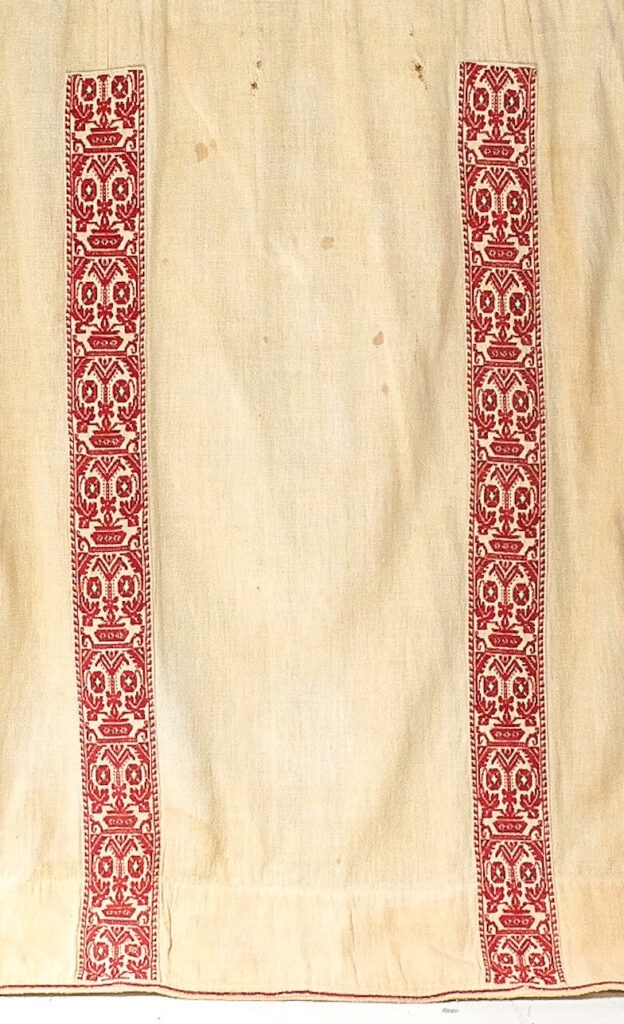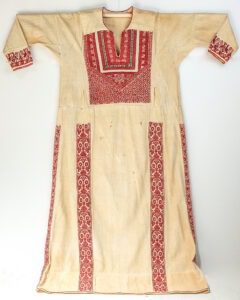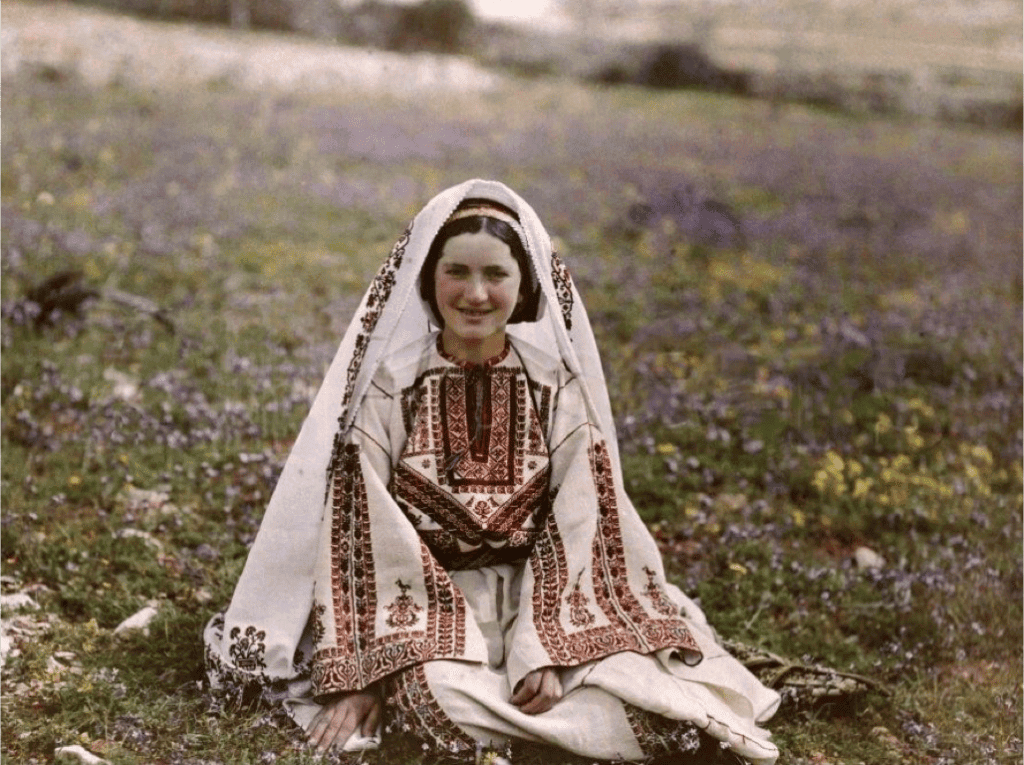
A Virtual Class with Wafa Ghnaim on Thursday, October 12, 2023



The thobe, a traditional embroidered dress handmade and worn for centuries by Palestinian women, is the bedrock of Palestinian textile artistry. Since the 11th century, Palestinian women have showcased their skillful stitchery on their traditional costume, displaying distinctive motifs, colors and styles across the various villages of old Palestine. This cross-stitch is a centuries-old art form yet it continued to evolve throughout the twentieth century in response to political, economic and social conditions of dislocated and dispossessed Palestinian refugees. The thobe ultimately transitioned from the private and domestic domains into a nationalist narrative, a unifying symbol of cultural identity.
Stitched Quwar motif on Waste Canvas
The skirt of a Palestinian thobe typically features panels, heavy embroidery that gives a mural-like quality to the skirt of the dress. Waste canvas is the most traditional technique used to create the Palestinian thobe.
In this class we will work on a Quwar, a flower pot design from Ramallah قوار found on a Thobe from the TATTER collection. Ramallah is well known for its flower fields, historic images from the area show women sitting in these fields embroidering their garments. Palestinian women were known to integrate the landscape around them into stitched designs, therefore this area is also well known for floral motifs found on Thobes. In this tradition, floral motifs represent beauty and celebration.
Wafa has created this class exclusively for TATTER based on a Thobe in our collection, we are honored to celebrate the pattern which keeps the dress and the spirit of the embroiderer alive.
Size of motif will be 60 stitches x 60 stitches
Dates
Thursday, October 12, 2023
Time
12pm – 2:00pm EST
Location
Zoom, a link will be send to participants the day before class
Cost
$60 for the individual class, $350 for the series
*This session will be recorded. A link to the recording will be emailed to all those who register following the live session. This link is live for one month for you to watch at your convenience.
CLASS MATERIALS
- Waste canvas: Wafa suggests 10 count for beginners but sometimes, only 14 count is available. Both will work for class. Palestinian embroiderers always consider 14-18 count the most beautiful, but 10 count is much easier to learn on. You will need a piece of waste canvas that can accommodate 80 x 80 stitches.
- (Finished) Fabric: You can embroider onto any non-stretchable cloth including tea towels, shirts, aprons, pencil pouches, and more. A fabric idea list is here. We encourage you to stitch with what you have at home.
- Thread: DMC size 8 pearl cotton thread is most suitable for size 10-12 waste canvas. Some may find it too big for 14 count waste canvas, in which case a thicker pearl cotton thread is recommended. Wafa uses size 8 pearl cotton thread for 14 count waste canvas projects.
- Needles: It is important you find a needle that is comfortable for you. Wafa works with a size 5 needle from a pack of DMC 1-5 Embroidery Needles. You are welcome to experiment with them all to find your own. If you want the most versatile needle pack, purchase the DMC 1-5 Embroidery Needle 12-pack.
- Proper lighting: A table lamp or natural light are helpful, but a headlamp can be a game changer! you can stitch anywhere, anytime!
- Additional useful supplies:
- embroidery scissors
- long pins
- washable fabric pen
- sewing thread
- seam ripper
- tweezers
- measuring tape

OUR TEACHER
Wafa Ghnaim
Wafa Ghnaim is a Palestinian researcher, author and educator who began learning embroidery from her mother, award-winning artist Feryal Abbasi-Ghnaim, when she was two years old. Her first book, “Tatreez & Tea: Embroidery and Storytelling in the Palestinian Diaspora” (2018), documents the traditional patterns and stories passed on to her by her mother. Wafa has since become a leading educator in the field as the first-ever Palestinian embroidery instructor at the Smithsonian Museum, Collections Specialist for the Museum of the Palestinian People in Washington, D.C., and a textile researcher for The Metropolitan Museum of Art’s Palestinian and Syrian textile collections. Wafa continues her mother’s educational legacy through The Tatreez Institute (Tatreez & Tea), a global arts education initiative she began in 2016 teaching courses in-person and virtually and traveling the world to raise awareness about Palestinian & Syrian arts and culture. Wafa has been featured in major media outlets, recently featured in Vogue Magazine, naming her and her mother “the world’s leading guardians of tatreez”. Wafa currently resides in Washington, D.C.
